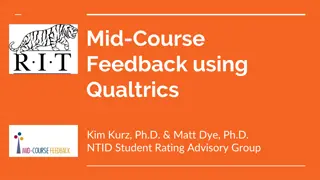
Analysis of Mid-Quarter Evaluations at UW: Insights and Findings
Discover the key themes and insights from mid-quarter evaluations conducted by the Office of Educational Assessment at UW Information Technology. Explore topics helping and hindering student learning, along with suggestions for instructor improvement. Gain valuable perspectives on course materials, interactions, and student experiences.
Download Presentation

Please find below an Image/Link to download the presentation.
The content on the website is provided AS IS for your information and personal use only. It may not be sold, licensed, or shared on other websites without obtaining consent from the author. If you encounter any issues during the download, it is possible that the publisher has removed the file from their server.
You are allowed to download the files provided on this website for personal or commercial use, subject to the condition that they are used lawfully. All files are the property of their respective owners.
The content on the website is provided AS IS for your information and personal use only. It may not be sold, licensed, or shared on other websites without obtaining consent from the author.
E N D
Presentation Transcript
Analysis of mid-quarter evaluations Office of Educational Assessment UW Information Technology
Survey items and approaches Survey items analyzed (1) What is helping you to learn in this course? (2) What is hindering your learning in this course? (3) What can your instructor do to improve your learning in this course? Approaches Inductive process of constant comparison to identify themes (OEA) 500 randomly selected responses Topic modeling (Latent Dirichlet Allocation) to identify common topics (UW-IT) Analyzed complete data set 2
Sample Courses with fewer than seven student responses were excluded Themes across the three campuses were indistinguishable This presentation includes responses from the Seattle campus Total Responses Number of Courses Avg N of responses per Course Avg N of words per response Question What is helping you to learn in this course? 11420 534 21.39 16.67 What is hindering your learning in this course? 10561 502 21.04 24.5 What can your instructor do to improve your learning in this course? 9860 477 20.67 24.82 Total 31841 1513 21.04 21.79
What is helping you to learn in this course? Three topics/themes were identified in both analyses 1. Instructor ability to provide sufficient course material and resources Students mentioned worksheets, office hours, example problems/exams, textbooks 2. Available lecture material and course interaction Ability to view organized and engaging videos, recordings, readings weekly 3. Group work Students mention group discussions, breakout rooms/ groups, guest speakers, group projects
What is helping you to learn in this course? The topics were equally important
What is helping you to learn in this course? Additional themes identified in the qualitative analysis were: 1. Overall course organization/expectations syllabus, access to course materials, Canvas 2. Assessments homework assignments, quizzes, tests 3. Class discussions 4. Instructor engagement and flexibility
What is helping you to learn in this course? One-third of respondents in the qualitative analysis mentioned an aspect of the course specific to online learning. The most frequent responses were: Convenience of recorded lectures (e.g., Panopto, Zoom) Additional online resources provided or recommended (e.g., YouTube, Khan Academy) Breakout rooms/online study groups Online format (e.g., class adapted well, like to work at own pace) Online office hours/online meeting with professors Online discussion boards (e.g., Piazza, Slack)
What is helping you to learn in this course? The lectures are easy to follow and I like that the problem sets require me to really think about what I learned and how to apply that to actual problems. It helps the information stick with me better. Attending the lectures and reading the course material is helpful in learning about the material. The clearly laid out syllabus and the lectures. Organized modules for each week and consistent lab due dates. Clear link between lectures and assignments. Clear expectations. The instructor uploads his notes and Powerpoints shortly after each class, which is a good reference for me.
What is hindering your learning in this course? Five topics identified; topics 1-4 are most important Topic pairs 1 & 2 focus on course content & instructor interaction Topic pairs 3 & 4 focus on personal issues & peer interaction Terms that occur often within all topics include: zoom, canvas, talk, amount, understand, overwhelm, engage
What is hindering your learning in this course? Qualitative findings echo the topic modeling results and identified additional themes: One-quarter of respondents mentioned issues surrounding course structure and organization broadly defined. Respondents commented on course pace, lecture length, grading, and expectations Around 15% of respondents mentioned course content including challenging material, unclear explanations, and excessive workload Approximately 20% of respondents explained that they prefer in-person learning, noting that they generally find online courses less engaging and harder to focus on
What is hindering your learning in this course? In addition to a general preference for in-person learning, around 20% of respondents also commented on the following aspects of online learning as hindrances to their learning: Issues with technology (e.g., internet speed, insufficient hardware, poor recordings) Feelings of disconnect with classmates and/or professors Limitations of online discussion (e.g., unnatural conversation, hard to ask questions, hear other students) Studios/labs/field experience not as effective Breakout groups are ineffective (e.g., students don t participate, hard to communicate) Currently residing in different time zone
What is hindering your learning in this course? Online learning, the lectures are not entirely beneficial given that they rarely go through examples and when they do go over examples it takes up a lot of time to go over only one. Lack of motivation, inability to communicate with my team as often as needed, miscommunication because of shortened meet times... feeling like I can not do enough, no class life balance, long hours of screen time causing sleep problems, and (instructors) adding to the difficulty. Setting up these sessions outside of class hours is also more difficult as we do not have a physical space where this would have happened more naturally this used to happen all the time with instructors as well as peers in the studio and significantly helped improve the learning process. The workload for this course is significant between reading load, case analysis, discussion boards and memos. This leads to some weeks I'm picking and choosing what I can realistically get done. I generally work better when I am around other people who are also working, so being isolated from my general friend and study groups has made my motivation much lower than it normally is.
What can your instructor do to improve your learning in this course? Six primary topics were identified Topic 1, which focused on academics, was the most important topic Comments focused on academics More practice exercises Reviewing and posting homework solutions More notes on slides Better explanations of concepts Better defining group projects
What can your instructor do to improve your learning in this course? Additional five topics related to online learning Reduce the use of breakout rooms Demonstrate problems step-by-step and slow the pace Additional office hours and more active email communication Recording of the lectures Greater flexibility with grades and due dates
Key takeaways What is helping learning 1. Courses that are well-organized with clear expectations, and provide high-quality assessments, example problems and exams 2. The convenience of recorded lectures, additional online resources (YouTube, Khan Academy), and breakout rooms/online study groups 3. Instructors passion for the material as well as their understanding and flexibility during the pandemic and transition to online learning 4. Interactions with the instructor and classmates, group projects, group discussions, breakout rooms/ groups, guest speakers
Key takeaways What is hindering learning? 1. Course structure/organization including course pace, lecture length, grading, and expectations 2. Course content, subject matter, unclear explanations, and high workload 3. Aspects of online learning: issues with technology, feelings of disconnect between classmates and/or professors, limitations of online class discussion, ineffective breakout groups, and difficulty to engage and focus 4. An increase in stress and anxiety as a result of the pandemic, leading to difficulty focusing on schoolwork
Key takeaways What can your instructor do to improve your learning? Responses closely resembled responses to What is helping you to learn in this course? 1. Demonstrate problems step-by-step and slow the pace 2. Additional office hours and more active email communication 3. Recording of the lectures 4. Greater flexibility with grades and due dates 5. Additional material to enrich their learning, such as practice problems and exams, homework walkthroughs, more notes on slides and key concepts
Contributors and contact info UW Information Technology Henry Lyle, Ph.D. lyle3@uw.edu Peter Seibel Florencia Marcaccio Office of Educational Assessment Angela Davis-Unger, Ph.D. acd2@uw.edu






















